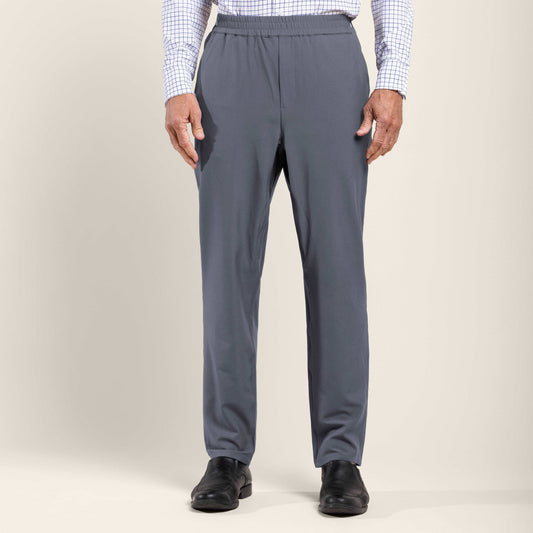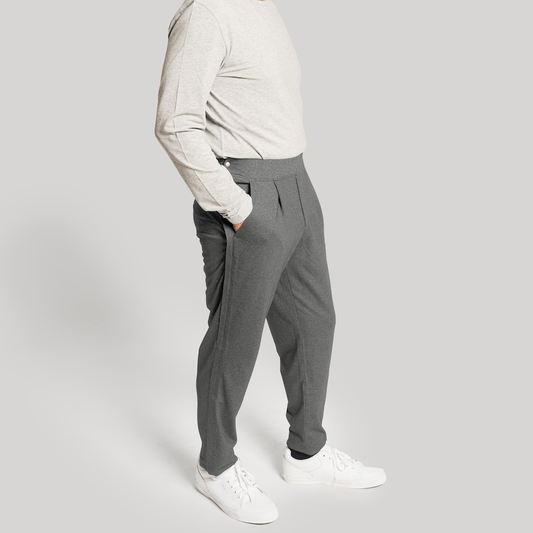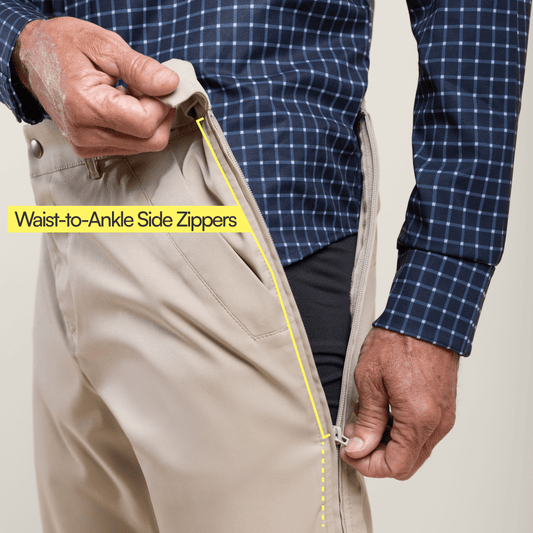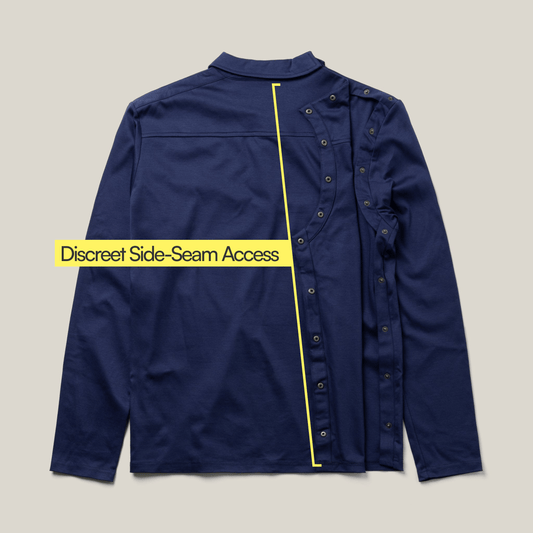Living with incontinence can be frustrating and challenging. The good news, availability of incontinence clothing, provides a practical and comfortable solution for managing this condition. Incontinence pants provide comfort, discretion, and effective leakage protection. In this article, we will explore various types of incontinence pants to help you make an informed choice based on your needs and preferences.
Disposable Incontinence Pants
Disposable incontinence pants are a convenient and user-friendly solution for managing urinary or fecal incontinence. These pants resemble traditional underwear and come with highly absorbent materials that quickly lock away moisture and prevent leaks. They feature elastic waistbands and leg cuffs to ensure a secure and comfortable fit. Disposable incontinence pants are available in various sizes, ranging from small to extra-large, to accommodate different body types. They also offer a range of absorbency levels, allowing individuals to choose the level of protection that suits their needs.
To use disposable incontinence pants, simply step into them as you would traditional underwear and pull them up to the desired position. Adjust the waistband for a snug fit, ensuring the pants sit comfortably on the waist. The leg cuffs should be positioned around the thighs to provide a secure seal.
Disposable incontinence pants are helpful for individuals with an active lifestyle or those who require assistance from caregivers. They are particularly beneficial during travel or outings. It's so much easier to discard after use instead of finding a way to carry and wash them. With their discreet design and reliable leak protection, disposable incontinence pants provide confidence and peace of mind for individuals managing incontinence.
Washable/Reusable Incontinence Pants
Washable or reusable incontinence pants offer a sustainable and cost-effective alternative for individuals seeking longer-term solutions. These pants are typically made from high-quality, durable materials such as cotton or moisture-wicking fabrics. They feature built-in absorbent layers and waterproof linings to prevent leakage. Washable/reusable incontinence pants are available in various styles, including briefs or pull-on styles, and come in a range of sizes to ensure a comfortable and customized fit.
To use washable/reusable incontinence pants, simply put them on as you would traditional underwear. Position them correctly around the waist and thighs. After use, remove the pants and rinse them under cold water to remove any excess urine or fecal matter. Wash them according to the manufacturer's instructions. Most likely you will machine-wash and air-dry. Another benefit of washable/reusable incontinence pants is the reduction of waste. They are better for the environment. In terms of how they perform, they provide the flexibility to customize absorbency levels by using additional inserts or booster pads if needed. Additionally, these pants are ideal for individuals with skin sensitivities. Many are made from hypoallergenic and breathable materials.
Pull-Up Incontinence Pants
Pull-up incontinence pants closely resemble regular underwear. The pants offer a discreet and user-friendly option for managing incontinence. Typically, manufacturers craft pull-up incontinence pants from soft, stretchable materials and design them with an elastic waistband that ensures a secure fit. Pull-up incontinence pants are available in various sizes to suit different body shapes and come in different absorbency levels to cater to individual needs.
Using pull-up incontinence pants is simple. Step into the pants and pull them up to the desired position, making sure the waistband sits comfortably on the waist and the leg cuffs are snug around the thighs. The pants should fit snugly without feeling too tight or restrictive.
Individuals who prefer a more independent approach to managing their incontinence find pull-up incontinence pants particularly suited for their needs. They are also a popular choice for caregivers as they offer ease of use and promote dignity and self-care. Pull-up pants are ideal for individuals with mild to moderate incontinence, allowing them to maintain an active lifestyle without the need for assistance or the use of adhesive tabs.
Adult Diapers
Individuals with moderate to severe incontinence widely use adult diapers, commonly known as briefs. These diapers are highly absorbent and provide maximum leakage protection. Manufacturers typically construct them with a combination of breathable materials, absorbent cores, and waterproof outer layers. Adult diapers come in various sizes to accommodate different body shapes and offer features such as odor control, wetness indicators, and adjustable tabs for a customizable fit.
To use adult diapers, lay the diaper flat and guide it under the individual's hips, ensuring the absorbent side faces up. Bring the front panel up between the legs and secure it with the adhesive tabs, adjusting the fit to achieve a snug yet comfortable feel. Positioning the leg cuffs around the thighs is essential to create a secure barrier against leaks.
Incontinence Briefs
Incontinence briefs, also known as incontinence underwear, feature a design that closely resembles regular underwear, with the added benefit of built-in absorbent pads. These briefs offer a discreet and comfortable option for managing incontinence. Manufacturers typically use soft, stretchable materials to ensure that these briefs provide a snug fit without feeling restrictive. Incontinence briefs come in various styles, including boxer briefs or bikini-cut briefs, and offer a range of sizes to accommodate different body shapes.
To use incontinence briefs, one can simply put them on like regular underwear. This ensures that the absorbent pad is properly positioned at the front for men or centered for women. Adjust the briefs for a comfortable fit around the waist and thighs.
Incontinence briefs are suitable for both men and women who prefer the familiarity and discretion of regular underwear while benefiting from the added protection against leaks. They are ideal for individuals with mild to moderate incontinence and provide a convenient and comfortable solution for everyday use.
Protective Undergarments
Protective undergarments are specially designed for individuals with light incontinence or those leading an active lifestyle. These undergarments are typically made from moisture-wicking fabrics that keep the skin dry and feature slim profiles for discretion. They may also incorporate odor control technologies to provide added confidence throughout the day.
Using protective undergarments is straightforward. Put them on like regular underwear, ensuring a comfortable fit around the waist and thighs. The undergarments should sit snugly without feeling too tight.
Protective undergarments are preferred by individuals who require minimal to moderate absorbency and desire a discreet and comfortable solution. They are particularly suitable for individuals leading an active lifestyle, participating in physical activities, or those who need reliable protection against occasional leaks.
Adaptive Pants
Adaptive pants are specifically designed to accommodate incontinence products while maintaining a regular appearance. These are used in addition to incontinence products. These pants feature discreet openings or specialized pockets that allow for easy access and integration of incontinence pads or briefs. Adaptive pants are typically made from comfortable and breathable materials, ensuring comfort throughout the day. Adaptive pants might come with side zippers or inseam zippers that not only make it easier to put them on and off, but provide easy access to incontinence products and other medical devices.
To use adaptive bottoms, simply put them on like regular pants, adjusting the waistband and leg openings for a comfortable fit. The discreet openings or pockets are strategically placed to allow for easy insertion or removal of incontinence products. Adaptive pants provide a practical and dignified solution for individuals who prefer to wear traditional-looking pants while ensuring easy access for managing their incontinence needs. Some pants are designed to specifically hide the appearance of incontinence products. They are suitable for various settings and social situations where discretion is important, such as during work or social events.
Overnight Incontinence Pants
Overnight incontinence pants are specifically designed to provide maximum absorbency, leak protection, and comfort throughout the night. These pants feature high-capacity absorbent cores and additional leak guards to prevent leakage and maintain dryness during extended periods of sleep. They are typically made from soft and breathable materials to promote a comfortable sleeping experience.
Using overnight incontinence pants is similar to using other types of incontinence pants. Put them on as you would traditional underwear, adjusting the waistband and leg cuffs for a secure fit. The pants should feel comfortable without being too tight.
Overnight incontinence pants are preferred by individuals who experience heavy leakage during sleep. They also help those who have difficulty waking up for frequent nighttime changes. This is a great resource for caregivers! They minimize disruptions during sleep and provide peace of mind knowing that the individual will wake up feeling dry and comfortable.
Conclusion
Choosing the right type of incontinence pants is essential for managing urinary or fecal incontinence effectively. Whether you opt for disposable pants, washable/reusable options, pull-up pants, adult diapers, incontinence briefs, protective undergarments, or overnight pants, consider factors such as absorbency level, comfort, ease of use, and individual preferences. And, of course, look for high-quality adaptive pants to help manage and supplement your other choices. By selecting the most suitable incontinence pants, you can regain confidence, maintain an active lifestyle, and enjoy comfort and peace of mind.
Joe & Bella's Adaptive Apparel Collections:
Men's Adaptive Clothing | Women's Adaptive Clothing | Men's Adaptive Shirts | Women’s Adaptive Shirts | Men's Adaptive Pants | Women’s Adaptive Pants | Gripper Socks | Side Zipper Pants | Compression Socks | Best Adaptive Clothing | Adaptive Apparel

























































